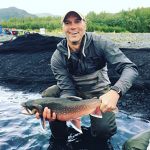Volunteer Spotlight

In college, Trent Dodson was most fascinated in his biology classes. He tells a story of one of his professors, a parasitologist, who took the class out to a stream to look for snails. Dodson was hooked. He went on to take classes on insects and other critters, eventually settling on ichthyology, the study of fish.
After graduating, he taught school for a year. But it wasn’t for him, and he decided to look for something different. That search brought him to Alaska in 2001.
“I came up to work a summer job for Cook Inlet Aquaculture Association,” he says. In the fall, they asked him to stay on. Dodson has been an Alaskan ever since.
He mainly managed projects, but with his background in education, he ended up with some public outreach duties. He discovered that he liked teaching when it wasn’t in a structured classroom.
Joining the citizen oversight club
While at the association, Dodson was elected to serve as the commercial fishing representative on the Cook Inlet Regional Citizens Advisory Council. He enjoyed this partnership so much that, later, when a position opened up in 2007, he applied to become their public outreach coordinator.
After a few years there, Dodson started to miss working directly with fish and in the outdoors. Then, on a trip to Kodiak, he fell in love with that community. Conveniently, the Kodiak Regional Aquaculture Association was hiring, so he got back to his aquaculture roots.
Dodson is currently the production and operations manager at Kodiak Regional Aquaculture Association.
The association enhances and rehabilitates salmon runs on and near Kodiak Island. Each year, they collect hundreds of millions of eggs from five salmon species and rainbow trout. The fry from these eggs are raised at their two hatcheries until they are older and able to better fend for themselves. The association also conducts research and monitoring of wild salmon habitats. This work ensures that enough fish are available for commercial, sport, and subsistence fishing.
Dodson’s job is to make sure they have all the right permits kept up to date and that their facilities are staying in compliance and meeting production goals.
“As you would imagine, you have to be highly regulated to release fish here and there, raise fish, and manage net pens in the ocean.”
He says oil spills are a concern in that industry.
“Aquaculture associations directly saw ramifications from the Exxon Valdez oil spill,” Dodson said. “If commercial fisherman can’t fish, that’s where we get our money to produce fish.”
Growing up in Indiana, volunteering wasn’t something he gave much thought to. But now, whether it’s his nephew’s fourth grade basketball team, the local chamber of commerce, or the Kodiak Maritime Museum, he’s always helping someone. He says his role on the IEC is a good fit for many of his interests. It scratches his itch for education that he doesn’t get elsewhere.
IEC’s projects engage audiences of all ages, but his favorite involve kids. He loves helping with the Masters of Disaster program that brings the Council’s lesson plans to life in the communities.
“You’re teaching at a very small, focused level, but these are building blocks to more complicated lessons for older kids and teenagers and adults.”
He also says it’s important to spread awareness of the Council’s work and the concept of regional citizens advisory councils.
“With the IEC, we can go out and help educate those people that may not even be aware of what is happening.”
“This mechanism [regional citizens advisory councils] doesn’t really exist anywhere else. It allows us to help prevent a disaster like we saw before.”